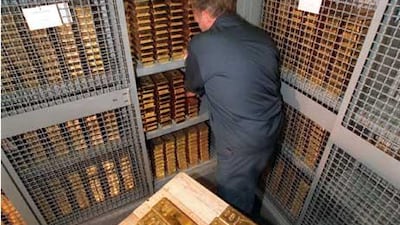GCC states should boost their foreign reserve holdings of gold to help shield their billions of dollars of assets from turbulence in global currency markets, say economists at the Dubai International Financial Centre Authority (DIFCA).
Diversifying more of their reserves from US dollars to the yellow metal would help to offer central banks in the region higher investment returns, said Dr Nasser Saidi, the chief economist of DIFCA, and Dr Fabio Scacciavillani, the director of macroeconomics and statistics at the authority.
"When you have a great deal of economic uncertainty, going into paper assets, whatever they may be - stocks, bonds, other types of equity - is not attractive," said Dr Saidi. "That makes gold more attractive."
Declines in the dollar during recent months have dented the value of GCC oil revenues, which are predominantly weighted in the greenback.
Gold prices rose to a record high before falling back this week as the dollar strengthened.
Longer term, gold could play a more important role in the global monetary system as the shift from developed world to emerging markets intensified, the two DIFCA economists said in a report published yesterday.
The dollar's position as the leading reserve currency was likely to diminish as US dominance of the world economy dwindled.
Gold could help to fill the void in the monetary system in the absence of the euro or the yuan proving viable alternative reserve currencies, they said.
The greenback accounts for almost two thirds of global reserves and serves as a currency peg for 89 nations including five of the six GCC currencies. The region is a significant holder of US Treasury bills, considered a low risk but also low return investment.
GCC states have historically maintained less than 5 per cent of their total reserves in gold. About 12 per cent of Kuwait's reserves are in gold, with the holdings of Saudi Arabia and Qatar even smaller at about 2.7 and 2.3 per cent, respectively. The UAE's gold reserves are believed to be negligible, although the Central Bank does not disclose the amount.
Recent turmoil in currency markets has hastened moves by other emerging markets including India, China and Russia to add to their gold reserves. Gold accounts for about 25 per cent of the total reserves of the European Central Bank.
"The value of paper money is being debased by injections of quantitative easing in Europe, Japan and the US," said Dr Scacciavillani. "Gold is a means of exchange not dependent on any political decisions and has a role as a hedge against inflation and economic risk."
While gold is proving to be a safe haven for investors during recent economic uncertainty, an easing of volatility in currency markets could yet attract investors back to paper assets.
"Investors are likely to get rid of gold when the economy picks up, as gold has no industrial value," said Alessandro Magnoli Bocchi, the chief economist of the Kuwait China Investment Company.
Longer term, the commodity's importance would not diminish the need for the GCC to develop more monetary independence by pressing ahead with a single currency project, he said.

